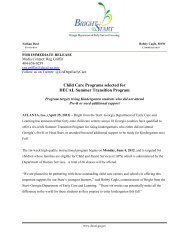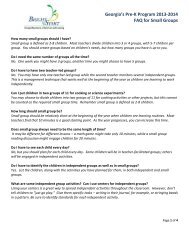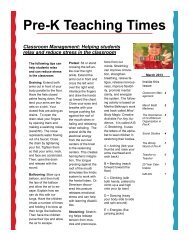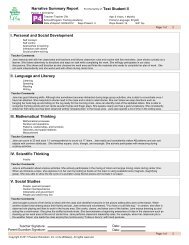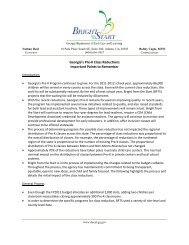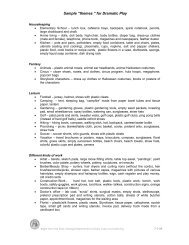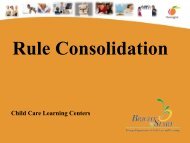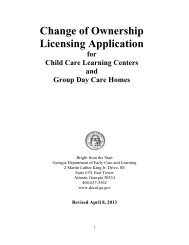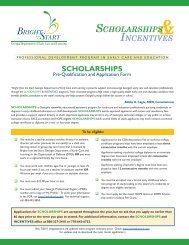Georgia's Pre-K Program - FPG Child Development Institute ...
Georgia's Pre-K Program - FPG Child Development Institute ...
Georgia's Pre-K Program - FPG Child Development Institute ...
Create successful ePaper yourself
Turn your PDF publications into a flip-book with our unique Google optimized e-Paper software.
Georgia Study of Early Care and Education:<br />
Findings from Georgia’s <strong>Pre</strong>-K <strong>Program</strong><br />
In 2007–08, 38 states offered pre-kindergarten programs, and close to one<br />
million 4-year-olds attended a preschool program funded by their state. 1<br />
Georgia has always been at the forefront of the pre-kindergarten movement,<br />
starting its first pre-kindergarten program in 1992 and creating the nation’s<br />
first state-funded universal prekindergarten in 1995. As a universal program,<br />
Georgia expanded its program’s scope from serving only “at risk” children<br />
to serving 4-year-olds across all income levels whose families desired prek.<br />
2 Georgia’s <strong>Pre</strong>-K was established under the leadership of Governor Zell<br />
Miller, using funds from a state lottery. The program aims to provide high<br />
quality preschool experiences to 4-year-olds in order to help prepare them for<br />
kindergarten. 3<br />
The number of children served in Georgia’s <strong>Pre</strong>-K <strong>Program</strong> has been steadily<br />
increasing since the program’s inception. In 2007–08, the program served<br />
78,000 4-year-olds, about half of all 4-year-olds in the state. 4 Georgia’s <strong>Pre</strong>-K<br />
classes can be housed in various types of facilities including public schools,<br />
child care centers, charter schools, and military bases. Classes meet for<br />
6.5 hours per day, 180 days per year, generally following the public school<br />
calendar. 5 The program is offered in every county in Georgia, and the state<br />
spends about $4,200 per year per enrolled child. 6<br />
Past research indicates that participation in state-funded pre-k is linked to<br />
higher academic and social skills for school, 7 with higher-quality programs<br />
linked to greater gains. 8 Thus, ensuring that Georgia’s <strong>Pre</strong>-K classes are of<br />
high quality is critical for meeting the program’s goal of helping children<br />
prepare for school.<br />
Bright from the Start: Georgia Department of Early Care and Learning<br />
(DECAL) has been working to define and promote high quality practices across<br />
multiple types of child care settings, including Georgia’s <strong>Pre</strong>-K. A statewide committee<br />
began working in the fall of 2006 to develop indicators to define quality in Georgia’s early<br />
care and education system. In the fall of 2007, DECAL contracted with researchers from<br />
the <strong>FPG</strong> <strong>Child</strong> <strong>Development</strong> <strong>Institute</strong> at the University of North Carolina at Chapel Hill to<br />
help refine the indicators, develop tools to measure them, and plan a study of the quality<br />
of care across the state. 9 DECAL decided that a statewide study would help policymakers<br />
better understand the quality of care across Georgia and provide useful information<br />
about the types of efforts that could best maximize investments in quality.<br />
“The<br />
growing<br />
enrollment in<br />
state pre-k . . . is<br />
valuable to children<br />
and the nation<br />
only if program<br />
quality is high<br />
enough to produce<br />
meaningful gains<br />
in learning and<br />
development.”<br />
Barnett et al.,<br />
2008,<br />
p. 2<br />
1




